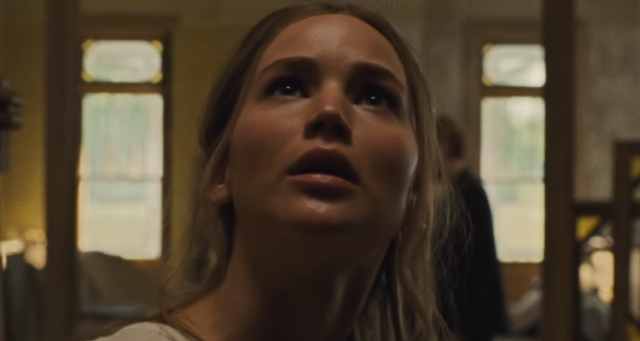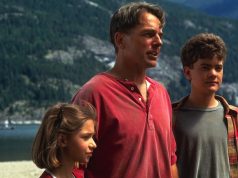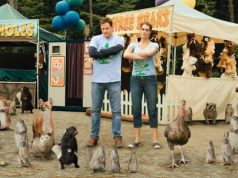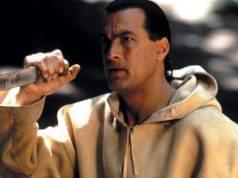
It’s immediately clear that “mother!” is not to be taken literally, as it starts with a reverse time-lapse of a rotting corpse in a bed forming back into a sleeping Jennifer Lawrence. That sort of thing doesn’t happen literally, not where I come from. The pleasure in writer-director Darren Aronofsky’s feverishly surrealistic allegory about God and His creations is seeing how he (Aronofsky) translates it into a domestic horror story that’s riveting even when you don’t understand why things are happening. Which I guess is a good metaphor for life, too.
Nobody has names here; the credits call Lawrence’s character Mother. Initially photographed so as to emphasize her suppleness and fertility, she has an idyllic, peaceful life in a spacious country house with her somewhat older husband, Him (Javier Bardem), a renowned poet. (A renowned poet? See, this can’t be literal.) Mother is nearly finished with the monumental task of restoring each room in the house after a tragic fire that occurred before she met Him; he’s hoping she will be the muse who gets him out of his writer’s block. He hasn’t created in ages.
Out of nowhere there arrives a Man (Ed Harris — not bad for a Man) whom Him invites to stay the night. The Man’s very presence upsets Mother physically, but her husband didn’t ask her opinion before making the offer. We soon see a pattern: nobody listens to Mother. She tends to everyone’s needs, but her own feelings are ignored. When the Man’s wife (Michelle Pfeiffer) arrives, the two are an almost comical pair of rude, brazen houseguests, entertained and indulged by Him while Mother cleans up. And then their two sons show up, fighting…
Have you figured it out yet? Mother is Mother Nature, Gaia, the Earth goddess. The house is an extension of herself, its sudden outbreaks of wood rot and other injuries a manifestation of her emotions. (When she places her hand on the wall, she feels a heartbeat.) Her husband is God, whose need to create and be loved leads Him to admit intruders into their paradise who trample everything and ignore Mother Nature’s warnings. God gets all the glory, but Mother is the one burdened with the temporal support of His creatures. When death is introduced to this world, it creates a whole new way for Mother to feel pain and anguish, represented by the ever-burning furnace in the basement.
And that’s all just in the first third of the movie! The rest of it continues the metaphor of God and His nature-wife, incorporating not just Old Testament themes but the New Testament, end-of-days calamities, and elements of other belief systems about the Earth, her origin, and her destiny. This may be giving Aronofsky too much credit, but many of the film’s details remind me of the Old Testament prophet Isaiah and the book of Revelation in that they seem to have multiple applications spanning different time periods. For example, the public’s reaction when Him finally writes a new poem could symbolize Jesus’ popularity in his own day as well as modern Christian zealotry. History is presented as happening all at once, not necessarily in a linear fashion.
That fits with the dreamlike logic of the narrative, which is what makes the story compelling, sometimes nightmarish, regardless of whether or how much you “get” it. As in a dream, time is collapsed (a funeral happens hours after the person’s death), situations escalate quickly, and odd occurrences are treated as normal. Aronofsky, always a fan of showing a protagonist’s subjective point of view, often makes it feel like Mother is dreaming even when she’s awake. The things that happen to her — unexpected guests, being dressed inappropriately for an occasion, not being heard — are the cold-sweat frustrations we all dream about.
I don’t think everything in the film has a one-to-one correlation with something from the Bible or world religion. Some details exist simply to make the story work. And while Aronofsky has made it clear that Jennifer Lawrence = Mother Earth is his primary metaphor, there’s enough creative ambiguity to allow for other, complementary readings. It could be a parable about living with artistic geniuses who become obsessed with their work to the exclusion of all else (in which case it should be a red flag to anyone contemplating a relationship with Aronofsky, whose current girlfriend is … Jennifer Lawrence). It could be about society’s treatment of women in general, not just Mother Nature. It may imply a mistrust of God and a pessimistic view of humanity that I don’t personally share, but it’s thrilling to see a major filmmaker and major movie stars explore it so boldly and with so little regard for convention.
A- (2 hrs., 1 min.; )





